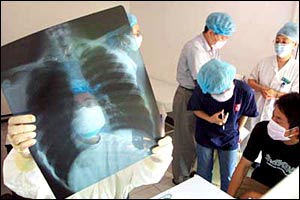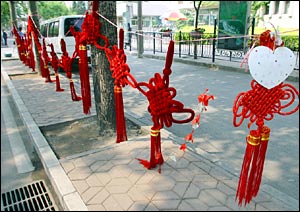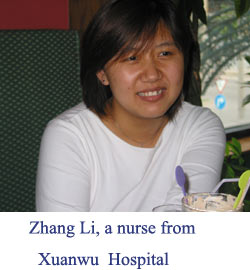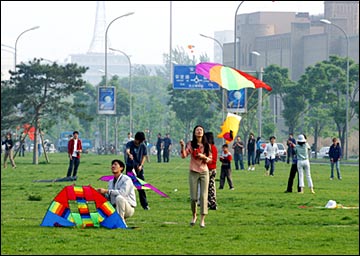"2003 was a special year to me; I think I'll remember it all my
life. It's a treasure to me," says Liu Qinghai, a young doctor from
Beijing's Xuanwu Hospital.
The truth is, 2003 was a special year to everyone in China,
particularly those in the capital city. It was the year of SARS.

They are all average citizens: doctors, nurses, students and
company clerks. None of them anticipated disaster one year ago, but
when it struck they hunkered down and fought. Now, a year after
that heartbreaking -- but also in many ways inspiring-experience,
they recall those days and reflect on how their lives were
changed.
Looking at the face in the mirror
The SARS epidemic was in many ways a test. It tested the mettle
of those who faced it, bringing out their best -- or their worst.
The courageous confronted it head-on, while the timid buried their
heads in the sand. Medical workers, family members and friends
risked their lives to care for others, while profiteers opted to
make money selling false hope at high prices.
Liu Qinghai, Yang Jing, Wang Xu and Zhang Li are four medical
workers from Xuanwu Hospital who endured the test of SARS last
year.
Liu Qinghai says that doctors are in many ways like soldiers.
Troops in combat don't think about death all day long, because they
facing it. Says Liu, "If you get hit by a bullet, you'll die. It
doesn't matter what questions you had about it beforehand. So as a
doctor, you must do everything you can to save patients' lives,
while doing your best to keep yourself alive too."
Yang Jing is also a doctor, calm and determined by nature. When
one of his friends heard last year that he was going to do battle
with SARS on the front lines, she advised him to change his job.
Yang refused. "If I had abandoned my career last year, I would have
carried the burden forever after. It's not how other people look at
you, but how you look at yourself after such an experience. People
have to live with the choices they make."
Wang Xu looks introspective as he listens to the others talk. "I
was still a student last year. When I requested to go to the front
line, our director refused. He said I was still a student. No one
wanted the responsibility if something happened to me -- I mean
catch the disease. So when I heard that SARS reappeared last month,
I thought I could participate this time."
Wang says he volunteered to join the SARS fighting force because
he hoped to emulate people he admired. "During SARS, I gained a
true picture of some friends. Actually, the most dangerous work was
not on the front line, but at the fever clinic before Xuanwu
Hospital became a designated SARS hospital, because protection was
not very good. SARS was a new disease, so even doctors didn't know
how to protect themselves from it. But doctors were needed urgently
in the fever clinic. Two of my friends were told in the morning
that they were to go work in the fever clinic, and they had the
afternoon to prepare. One of them was from Miyun District and he
had just come back from home; the other was from Shunyi District
and he had not gone home for a week. Since they had no time to go,
they just called home and then entered the fever clinic. I believe
they will remain my most admired friends all my life."
Zhang Li is a nurse at Xuanwu Hospital. Before the epidemic she
had planned to change careers, because she found the job tiring and
thankless. But SARS brought new meaning to her work.
Zhang was working in a SARS inpatient ward last year. One
evening around 11 o'clock, an elderly patient pushed the call
button. She went to the wards and found that his roommate, whose
illness was aggravated by a preexisting condition, had begun to
cough up blood. The old man asked to be moved to another room.
Since all the patients were assigned rooms according to the
severity of their illness, Zhang refused at first. But the old man
called her again and again. Finally, he caught her hands in his
trembling ones and said, "My wife and I just traveled back from
another province. We all caught SARS. She passed away yesterday,
but I still want to live. I don't want to die. Please save me,
Nurse, please. I'm afraid of death."
Zhang's voice sounds choked as she recalls this. "My goggles got
fogged up then, and I called our chief to ask if we could grant his
request. I got permission and moved him to a different room." The
next day, as she made her rounds of the wards, the old man held her
hands and said, "I know you! It's you that changed my room last
night." ?Since the medical workers were covered from head to
toe in layers of heavy protective gear, with only their eyes
visible behind goggles, Zhang was amazed that he recognized
her.
Says Zhang Li, "I knew that I was needed. That moment, I
thought, was worth all the work I had ever done."
By the people, for the people

The medical
personnel may have been fighting on the front lines of the SARS
war, but average citizens were in the trenches as well. Because of
the highly contagious nature of SARS, every individual had a
responsibility to avoid the possibility of infecting those around
him, as well as to take precautions to avoid becoming infected
himself.
Wang Xu tells the story of an elderly woman who went to the
outpatient clinic at Xuanwu Hospital, which stayed crowded with
worried people in those days. The woman whispered to the
receptionist that she had to be examined alone, and that other
people should be kept away from her. At first, thinking that she
was afraid of being infected and embarrassed, the receptionist
refused. But then the woman said quietly that her husband had just
died of SARS, so she was afraid of infecting others. She did not
want to say it out loud because she was afraid of causing panic
among those who were waiting.
Yuan Jiangming, a postgraduate at Tsinghua University,
recalls Enos, an American public relations professor she knew. Enos
only taught two postgraduates, as he was in China on a government
research grant. When news of the SARS epidemic came out, Tsinghua
gave all the teachers the choice of whether to continue their
classes, but advised those who kept up the lectures to wear gauze
masks in class. Enos continued teach his two students until the US
Embassy grew somewhat urgent in advising him to return home. As he
hugged the students in farewell, Enos said he wasn't scared at all,
but that he had no choice but to leave.
Many teachers stayed at their lecterns throughout the crisis
that hot May, lecturing through their thick gauze masks.
Despite the unavoidable fears and tensions that everyone

felt in those
days, many people stayed on the job. From trash collectors and
cooks to cashiers and clerks, drivers, grocers, reporters,
utilities maintenance workers, bankers -- the list goes on and on.
Thousands upon thousands of ordinary people suddenly saw their
lives become all too extraordinary, but they recognized that by
pulling together everyone would get through the crisis.
Diamonds from coal
It is easy, in a crowded, fast-changing metropolis like Beijing,
to get caught up in the hustle and bustle of daily life. SARS
brought many people the opportunity to look beyond the superficial
and examine what is really important to them.
Li Mei, a postgraduate at Tsinghua University, says, "If a
person never thinks over the question of death, he will never know
the truth of life. When he seriously considers the possibility of
his own death, or that of his relatives and friends, he becomes
more mature."
Nurse Zhang Li says that during the war against SARS on the
wards of Xuanwu Hospital, she had her own personal battle with
death. "Working in a designated SARS hospital, all the medical
workers had to dress in many layers of protective clothing and
thick surgical masks. One really hot day in May, I was in the ward
with the patients. I suddenly felt I was suffocating, deadly
suffocation. I could feel the god of death standing at my shoulder.
I ran out of the ward, got out of the isolation area. I couldn't
endure a single second more inside those gauze masks. I breathed
deeply for almost half an hour before I felt better."

As a nurse in the
hospital emergency room, patient deaths had become quotidian to
Zhang. But her experience that day changed her perspective, and she
became eager to work because she had learned the horror of
impending death. "One minute sooner will give the patient a chance
to live one minute longer," she says.
People are willing to work hard and make many sacrifices in
their quest for money or power. But the SARS experience taught many
the inestimable value of a freely drawn breath of air. Tsinghua
student Yuan Jiangming says that many of her memories of the SARS
period are actually very pleasant ones. "Before SARS, students
always rushed about the campus to their studies. But during that
period, everyone got out of the classroom and out to the lawns to
chat or play badminton or poker or fly kites. During that period I
saw this uncommon innocence and happiness on the campus."
Zhou Shengping, another Tsinghua postgrad, caught a cold during
the SARS period and one day developed a fever. "I knew that I had
been very careful, but I still worried. As I lay in my bed that day
I thought that maybe I had caught SARS, but the next morning when I
woke the fever had gone and I knew I was still alive. You don't
know how happy I was." He smiles now at the recollection. "You
know, just being alive is such an enormous treasure. But life is
frail; no one knows when he is going to die. So we should treasure
what we have."
A test of true love
Li Mei's boyfriend was in Xiamen, Fujian
Province, and that April she couldn't bear her worry and
loneliness for him. She got on a plane and flew to Xiamen, wearing
her gauze mask. But when she stepped off the plane, she carefully
kept her distance. She told him she intended to stay in isolation
for a week, fearing that she might unknowingly be carrying the SARS
virus. "Forgive me," she said, "I'll owe you a kiss." But her
boyfriend claimed his kiss immediately, saying, "Let's be together,
whether it's for play, for quarantine or for death."
Yuan Jiangming recalls a fellow Tsinghua student whose boyfriend
developed a fever and was placed in quarantine. The girl didn't
hesitate for a moment, but risked her own health to care for him
while he was ill.
SARS proved to be a serious test for many young
couples. Like other colleges in Beijing, Tsinghua University shut
its gates with the students isolated inside to keep them safe. Zhou
Shengping's girlfriend was outside, and they had to meet with a
fence separating them. "She was sad every time we met. I felt it
was cruel, that such a tiny virus could keep us apart no matter how
much we missed each other."
Those are touching stories of true love, but in the case of some
romantic partners who were not quite so devoted to each other, the
separation that SARS started lasted forever. Some students couldn't
endure the loneliness of separation, so they took up with someone
else in the same lockdown area. One student jokes that there were
so many breakups and recombinations of couples on their campus that
it was like shuffling a deck of cards.
The sky is falling
Li Zhi runs a small retail business in Beijing. Like a number of
others, when SARS struck the capital city he closed his doors for
business. He and his family stayed indoors, quietly panicking and
grasping at every preventative straw they could find. Gauze masks,
the thicker the better; traditional herbal tonics in double doses;
hand-washing in antibacterial soap couldn't be done too frequently
-- or, for that matter, often enough. Thoroughly washed hands had
also to be soaked in disinfectants every day.

Now, with a year
separating him from those experiences, Li cannot help but laugh at
his own ignorance and fear. He likens their unthinking efforts to
prevent illness to firing a gun into the air: it frightens the
bystanders but doesn't harm a hair on the enemy's head.
Software engineer Wang Xueliang still can't laugh over his SARS
scare. During the worst of the crisis, he and his colleagues
continued to work on coding in a locked-down computer center in
Changping District, north of the city proper. Everyone turned pale
at the mention of SARS, he recalls.
Perhaps because of the pressure of work and the stress of
isolation in the center, Wang fell ill. His symptoms were similar
to SARS, except that he did not have the telltale high fever.
Nevertheless, panic filled his heart and he huddled in bed with
fantasies of a tortured death and prayers for recovery to every
deity he could think of. He was afraid his colleagues would abandon
him but was too fearful to communicate with anyone. Finally, one of
his supervisors had him checked: he was diagnosed with a very
common minor ailment.
Wang felt as if he had been pulled back from the voracious jaws
of death. He still recalls those days with a shudder, and no small
amazement at the calm and assurance of his colleagues. He cannot
imagine anything more horrifying ever happening to him, and all he
wants now is to live a calm and peaceful life.
No commodity more precious
Li Chunyu, a Bank of
China executive, is one of the organizers of the bank's hiking
and mountain -- climbing activities. In past years, they have had a
Mountain -- climbing Month at the Fragrant
Hills every May, but since the SARS experience Li and many of
his colleagues go hiking every weekend all year round. The Bank of
China is supporting their activities, providing yearly access
tickets for the Fragrant Hills, and also arranging for trained
doctors and an ambulance to be on hand in event of an
emergency.
Li says that many of the employees seem happier and their work
has improved greatly since the bank began encouraging participation
in outdoor activities like hiking. As long as everyone sticks
together and sticks it out, says Li, even a disease much worse than
SARS cannot beat them.
Ralph Jennings, a reporter for the South China Morning
Post who covered the SARS story every day last year, recalls
the cleanliness of the capital city during those days. He said he
never even caught a cold last spring, probably thanks to the
quantities of disinfectant used everywhere and people's concern for
one another. He was shocked one day when someone pushed him away,
apparently fearing that he had caught the disease. But he will
never forget the exhausted doctors and nurses who still managed to
make time for interviews with him.
Nurse Zhang Li says she knows now that health is the most
precious thing in the world, and that no amount of money or power
can surpass it.
Zhang says too that she had never truly understood familial love
until her experience with SARS. Her parents and other relatives
called her three times a day to cheer her and make sure she was
okay. And despite her own fear and exhaustion, she made an extra
effort to keep her family from suffering on her behalf.
Liu Qinghai, the doctor at Xuanwu Hospital, recalls feeling as
if he could hear his parents' heart beating together with his
during that time. On his own for years during his studies and work,
he had always been fiercely independent. But when the crisis was
over and he returned home, his heart nearly broke to learn that his
mother had cried every day when she heard news about Xuanwu
Hospital.

Retailer Li Zhi
says that earning money no longer gets highest priority in his
life. He laughs at the irrational fears his family shared during
the SARS crisis, but he also learned a serious lesson about value
in those days. His family means more to him than anything, and now
he takes the time to go fishing or fly kites with them, storing
memories of precious moments that he can enjoy for the rest of his
life.
(China.org.cn by Chen Lin and Wang Ruyue, June 17, 2004 )